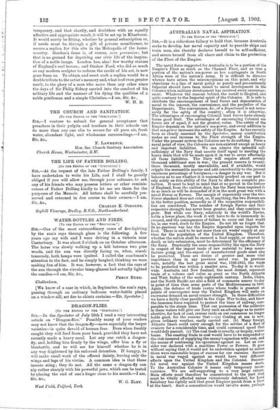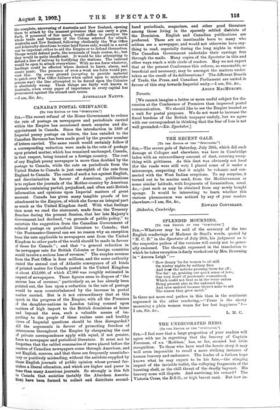AUSTRALIA'S NAVAL ASPIRATION. (To TEE EDITOR OF THE "SPECTATOR:1
SIR,—It is a ridiculous fallacy to hold that, because Australia seeks to develop her naval capacity and to provide ships and train men, she thereby declares herself to be self-sufficient, and severs herself from all share and claim to the protection of the Fleet of the Empire.
The naval force suggested for Australia is to be a portion of the
Empire's Fleet as much as the Channel Fleet, and as true a portion of the nation's sea-power as her contingents in South Africa were of the nation's Army. It is difficult to discover whence have arisen the misconceptions on this point, and why objections to a line of naval policy so purely and pre-eminently Imperial should have been raised to naval development in the Colonies when military development has received every encourage- moat. Whatever the reasons behind, the result is illogical, and quite contrary to the Imperial spirit of the Colonies. It is safe to attribute the encouragement of land forces and depreciation of naval to the interest, the convenience, and the prejudice of the Departments. The convenience, &c., of a Department is not neces-
sarily for the safety of the country; often it is otherwise.
The advantages of encouraging Colonial land forces have already borne good fruit. The advantages of encouraging Colonial sea forces are of equal, if not far greater, value. The safety of the
Empire depends on the nation's sea-power, and every addition to that sea-power increases the safety of the Empire. Els has recently been so clearly reasoned by the Spectator, money contribution makes no real increase to the Fleet strength of the Empire. Under the present system the Colonies are to do nothing. From a naval point of view, the Colonies are non-existent except as heavy and impotent liabilities. We can admire the splendid self- sufficiency of the Navy that asserts itself equal to meeting the heavy drain that will be made upon it in war to cover effectually all those liabilities. The Navy will require about seventy thousand additional men in war; the present reserve is twenty- three thousand, mostly unavailable, and if available, would cripple the mercantile marine and add considerably to the present enormous percentage of foreigners,—a danger in any war. But it behoves us to see whether it is reasonably prudent on our part to rely solely on this ability of the Navy to afford us complete pro- tection. It must be kept in mind that at no period in the history of England, from the earliest days, has the Navy been required to do so much as will be demanded of it in the next great war with a naval Power or Powers. The margin of superiority over the two- Power standard does not exist, or, if anything, the two Powers are in the better position, assuredly so if the respective responsibili- ties are considered. The number of foreign Navies and their respective strength has never been greater, and they continue to grow. But while our Navy, relatively to the world's Navies, holds a lower place, the work it will have to do is immensely in- creased, and the consequences of failure to carry out that would be, in one word, death to the Empire. Do not let us forget that. In no previous war has the Empire depended upon imports for food. There is said to be not more than six weeks' supply at any time for the population of the United Kingdom. Therefore, whether the nation shall be ensured a food supply, or starved to death or into submission, must be determined by the efficiency of the Navy. Practically the same responsibility lies upon the Navy in respect of the import trade of raw material to keep menu- facture going, and the export of manufactured goods must also be protected. These are duties of greater and more vital importance than in any previous naval war. In previous wars, notably the last great naval war, 1793-1815, the trade to be protected was within a smaller area. To-day it is world- wide. Australia and New Zealand, the most distant, represent trade of a volume and value as great as the North Atlantie and West Indies of the early eighteenth century. India, China, and the North Pacific are also a field of commerce nearer to-day in point of time than some parts of the Mediterranean in 1800. Again, the defence of trade routes where traffic is greatest at points of convergence near the United Kingdom will make an enormous demand on naval cruiser strength. In these difficulties we have a fairly close parallel in the Cape War to-day, and know the immense force required to protect the lines of railway, com- parable to the steam lines. That our possession of the collieries in these waters will give our Navy such an advantage as to render abortive, for lack of coal, cruiser raids on our commerce no longer holds good, for the reasons that :—(a) Coaling at sea is now, given ordinary weather, easily carried out. (b) Many foreign Atlantic liners could carry enough for the service of a fleet of cruisers for a considerable time, and could command speed that would defy pursuit. (c) The coal trade is usually, or largely, water- borne. The coasting trade in coal would have to be suspended or the risk incurred of supplying the enemy's squadron with coal, and the means of continuing his operations against us. Let us con- sider war declared with a maritime Power or Powers. It goes without saying that it would not be undertaken against us unless there were reasonable hopes of success for our enemies. Success in naval waragainst us would have very different effects upon the UnitedKingdom and the Colonies. Success- ful naval war against the United Kingdom means death.
To the Australian Colonies it means only temporary incon-
venience. We are self-supporting to -a very large extent. Main efforts must therefore be concentrated to the part that
must be vitally affected unless victoriously defended, for Lord Salisbury has rightly said that great Empires perish from a blow
at the heart. Such a concentration would involve some, perhaps the complete, uncovering of Australia and New Zealand, opening them to attack by the meanest privateer that can carry a gun. Such, if possessed of 'fair speed, would suffice to paralyse the whole trade and business of the Colony selected for attack. Australia and New Zealand, following obediently the War Office and Admiralty directions to raise land forces only, would in a naval war be impotent either to aid the Empire or to defend themselves. Troupe would defend ports, the terminals of trade routes, &c., but they would be quite insufficient. It would be like attempting to defend a line of railway by fortifying the stations. The railroad would be open to attack everywhere. With no sea force whatever, landings could be effected where desired to harry, alarm, and create panic. The presence of even a weak sea force would pre- vent this. On every ground (excepting to provide material to patch over War Office failures when called upon to undertake serious war) the line attempted to be forced upon the Colonies is absolutely wrong. These things are fairly well known in Australia, when every paper of importance in every capital has pronounced against the absurd cash nexus.







































 Previous page
Previous page